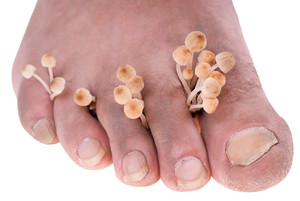 A fungal infection that is referred to as athlete’s foot can be uncomfortable and painful. The most common place for this condition to develop is between the toes, which may cause severe itching. The skin may become dry and flaky, and many patients notice a burning or stinging sensation. This ailment is known to be contagious, and lives in warm and moist environments. These areas many include swimming pools, shower room floors, or locker rooms. Additionally, athlete’s foot may develop as a result of wearing shoes and socks that are too tight. This can contribute to sweaty feet, which may create an environment for the fungus to thrive. There are measures that can be implemented, which may help to prevent athlete’s foot. These may include wearing appropriate shoes in public areas and washing the feet and completely drying between the toes. If you are afflicted with this condition, it is suggested to consult with a podiatrist who can guide you toward proper treatment.
A fungal infection that is referred to as athlete’s foot can be uncomfortable and painful. The most common place for this condition to develop is between the toes, which may cause severe itching. The skin may become dry and flaky, and many patients notice a burning or stinging sensation. This ailment is known to be contagious, and lives in warm and moist environments. These areas many include swimming pools, shower room floors, or locker rooms. Additionally, athlete’s foot may develop as a result of wearing shoes and socks that are too tight. This can contribute to sweaty feet, which may create an environment for the fungus to thrive. There are measures that can be implemented, which may help to prevent athlete’s foot. These may include wearing appropriate shoes in public areas and washing the feet and completely drying between the toes. If you are afflicted with this condition, it is suggested to consult with a podiatrist who can guide you toward proper treatment.
Athlete’s Foot
Athlete’s foot is often an uncomfortable condition to experience. Thankfully, podiatrists specialize in treating athlete’s foot and offer the best treatment options. If you have any questions about athlete’s foot, consult with one of our podiatrists from Jill Einhorn, DPM and James Einhorn, DPM. Our doctors will assess your condition and provide you with quality treatment.
What Is Athlete’s Foot?
Tinea pedis, more commonly known as athlete’s foot, is a non-serious and common fungal infection of the foot. Athlete’s foot is contagious and can be contracted by touching someone who has it or infected surfaces. The most common places contaminated by it are public showers, locker rooms, and swimming pools. Once contracted, it grows on feet that are left inside moist, dark, and warm shoes and socks.
Prevention
The most effective ways to prevent athlete’s foot include:
Symptoms
Athlete’s foot initially occurs as a rash between the toes. However, if left undiagnosed, it can spread to the sides and bottom of the feet, toenails, and if touched by hand, the hands themselves. Symptoms include:
Diagnosis and Treatment
Diagnosis is quick and easy. Skin samples will be taken and either viewed under a microscope or sent to a lab for testing. Sometimes, a podiatrist can diagnose it based on simply looking at it. Once confirmed, treatment options include oral and topical antifungal medications.
If you have any questions, please feel free to contact our offices located in Brooklyn and Astoria, NY . We offer the newest diagnostic and treatment technologies for all your foot care needs.